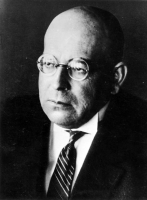| Oswald Spengler | |
| 奧斯瓦爾德·斯賓格勒 | |
| 奧斯瓦爾德·阿莫德·哥特弗德·斯賓格勒 | |
|
阅读斯賓格勒 Oswald Arnold Gottfried Spengler在百家争鸣的作品!!! | |
奧斯瓦爾德·阿莫德·哥特弗德·斯賓格勒(德語:Oswald Arnold Gottfried Spengler,1880年5月29日-1936年5月8日),德國歷史哲學家、文化史學家及反民主政治作。
《西方的沒落》是斯賓格勒於1918-1922年出版的歷史主義著作,在這本書中,斯賓格勒用自己的理論解釋世界歷史,反對將人類歷史看作為總是不斷進步的歷史的一種直綫型敘述(eine lineare Geschichtsschreibung)歷史的觀點,認為文化是循環的(Kulturzyklentheorie),文明在會經新生、繁榮之,最終會沒落衰亡,而西方文明正處於衰落之中。本書出版之成為歐洲和美國的暢銷書,也引起很大的爭議。
《西方的沒落》之,他出版《普魯士和社會主義》等書,但在德國之外影響很小。他支持德國統治歐洲,認為這是拯救西方文明的正途。有些人將他視為保守革命的思想大師;而有些人(如戈培爾)則把他看作是納粹主義的思想先驅,但他並不支持希特勒的納粹主義,在1933年被納粹驅逐。
1934年出版《决定時刻:德國與世界歷史的演變》,旋即成為暢銷書。本書批評自由主義,但也批評納粹的社會達爾文主義和反猶主義。雖然族神秘主義在他的作品中扮演重要角色,但斯賓格勒一直反對納粹的偽科學族主義,因此該書來在德國也被禁。作為德國的國主義者,他認為納粹的國主義太狹隘,因此不足以擔任統領歐洲的重任。本書也警告一場世界大戰即將來臨,西方文明要遭受重大威脅。
斯賓格勒對來的一些歷史學家影響很大,諸如阿諾爾得·湯恩比和弗蘭茨·鮑瑙(Franz Borkenau),但他的著作沒有成為當今歷史科學(Geschichtswissenschaft)的奠基之石。
中文出版
- 《西方的沒落》(全二),2006-10,譯者:吳瓊,上海:上海三聯書店(簡中文)
- 《决定時刻:德國與世界歷史的演變》,2009-8,譯者: 郭子林 、 趙寶海 、 魏霞 ,上海:格出版社,上海人民出版社(簡中文)
參考資料
- ^ So etwa Detlef Felken in seinem Nachwort des im C.H. Beck Verlag München erschienen Buches von Spengler Der Untergang des Abendlandes, „Daß Spengler Distanz zu den Nationalsozialisten hielt, darf jedoch nicht über das antidemokratische Potential der „Jahre der Entscheidung" hinwegtäuschen“, S. 1203
- ^ 劉蔚之,2007,《跨國知識轉移研究:以中國對德國教育學的接受與轉化(1928-1943)為例》,p.52 互聯網檔案館的存檔,存檔日期2014-03-10.
- ^ Alexander Demandt, Spenglers Untergang, in: Die Literarische Welt, Beilage zu Die Welt, 27. März 1999.
- ^ Manfred Funke, Hitler, Deutschland und die Mächte: Materialien zur Aussenpolitik des dritten Reiches, Droste Verlag 1976, S. 433.
- ^ Carl von Ossietzky, Stefan Berkholz, Carl von Ossietzky, 227 Tage im Gefängnis: Briefe, Dokumente, Texte, Luchterhand Verlag 1988, S. 305.
Oswald Arnold Gottfried Spengler (German: [ˈɔsvalt ˈʃpɛŋlɐ]; 29 May 1880 – 8 May 1936) was a German historian and philosopher of history whose interests included mathematics, science, and art and their relation to his cyclical theory of history. He is best known for his two-volume work, The Decline of the West (Der Untergang des Abendlandes), published in 1918 and 1922, covering all of world history. Spengler's model of history postulates that any culture is a superorganism with a limited and predictable lifespan.
Spengler predicted that about the year 2000, Western civilization would enter the period of pre‑death emergency whose countering would lead to roughly 200 years of Caesarism (extraconstitutional omnipotence of the executive branch of the central government) before Western Civilization's final collapse.
Spengler is regarded as a nationalist and an anti-democrat, and he was a prominent member of the Conservative Revolution. However, he criticised Nazism due to its excessive racism. Instead, he saw Benito Mussolini, and entrepreneurial types, like the imperialist mining magnate Cecil Rhodes, as embryonic examples of the impending Caesars of Western culture, notwithstanding his stark criticism of Mussolini's imperial adventures.
He strongly influenced other historians, including Franz Borkenau and especially Arnold J. Toynbee and other successors like Francis Parker Yockey, Carroll Quigley and Samuel P. Huntington.
John Calvert notes that he is also popular with the Islamists, who mobilize his critique of the West.
